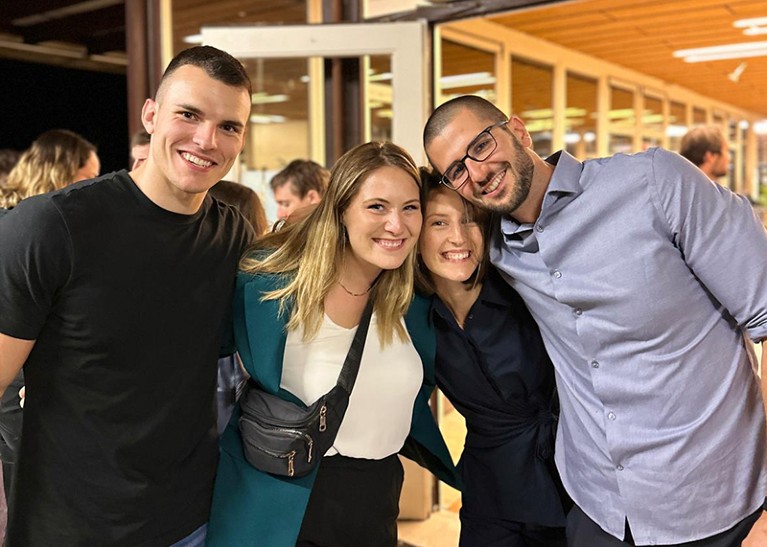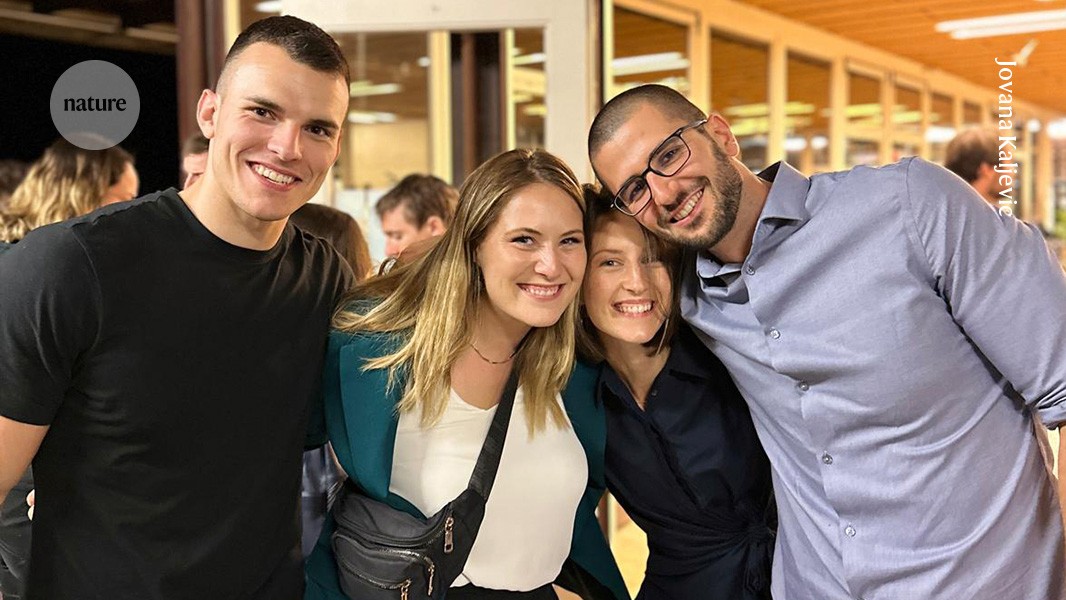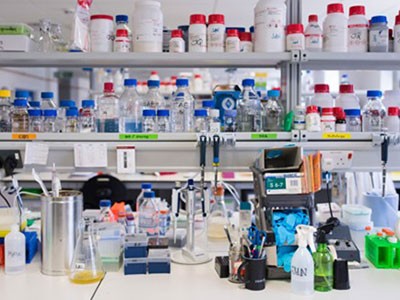
(Left to right) Miloš Tišma, Milica Jeličić, Jovana Kaljević, and Boris Stojilković, who all met at university, set up an online journal club to stay in touch and discuss research.Credit: Jovana Kaljevic
Chasing the best scientific career opportunities often means leaving behind homes, universities and friends. This happened to the four of us when we began our PhDs.
We first met in 2013 during the first weeks of our biology undergraduate studies at the University of Belgrade, Serbia, and quickly bonded over interesting scientific discussions. Soon after, we became inseparable. We met before each exam, bouncing ideas and possible questions off one another to boost our confidence before the exam day. We were on the same path, pursuing the same academic goals.
This changed when we started our separate PhD studies in 2019. One focused on plant pathogens at Ghent University in Belgium, another on gene therapy at the Technical University of Dresden, Germany, another (J.K.) studying bacterial biology at the University of Louvain in Louvain-la-Neuve, Belgium and one (M.T.) researching biophysics at the Delft University of Technology in the Netherlands. We pushed each other to follow our passions and pursue PhDs in the fields that excited us most, but our connectedness with one another faded, with each of us having our own goals, scientific areas of study and ambitions. At first, our differences felt like a challenge, but soon, we realized that they made our conversations more insightful.
The birth of the journal club
We were often informally catching up about our day-to-day experiments, new techniques we had learnt and papers we had read. It was during one of these chats, early in the COVID-19 pandemic in 2020, that someone suggested: “Why not formalize our discussions into something more structured?” And so, our journal club, playfully named Four Friends Doing Science (FFDS), was born.
We set up monthly online meetings, in which we would take turns bringing a paper to the group, sometimes from our field, sometimes outside it. We learnt about the new methods, dug through the supplementary data and questioned the conclusions of the papers. Each of us occasionally presented our data and work, including the short- and long-term goals of our PhDs. It was just like back in the undergraduate days — us studying together.
Collection: Career resources for PhD students
Every meeting we had also gave us the opportunity to talk about how we were navigating the ups and downs of our PhDs, each of us working in different systems and countries. We shared our frustrations with failed experiments, strategies for dealing with supervisors and excitement over fresh collaborations. What started as a way to stay engaged with the latest research became something we all looked forward to: an opportunity to learn, support and grow together.
Over time, it became clear that the real strength of our journal club was not just in staying up to date with science but in broadening our perspectives. We constantly challenge each other with thought-provoking questions such as: “Have you heard about this (re)emerging field of bacterial-defence systems?” or “What exactly led to the Nobel-prizewinning CRISPR–Cas9 system breakthroughs between competing laboratories?” These discussions push us to explore areas beyond our expertise.
Unexpectedly, the FFDS club also helped us to improve our communication skills and refine how we presented our work to those outside our specific fields. There are few things that sting a PhD student more than a well-timed “but what’s the point?” from someone outside of your field, yet this is a crucial question to ask when presenting any project. Being able to step back and explain the broader implications of our research became an essential skill, and it significantly boosted our confidence during conference presentations and collaborations.
Our online connection also reinforces our real-life connection. Over the four years that we have had FFDS, we have attended conferences together, visited each other’s labs for collaborations, won awards together and even written a joint paper. The four of us have now moved on to different academic and industrial settings (and new countries), and whether we maintain FFDS further, the support and knowledge we shared together will continue to shape our careers.
Our advice for anyone navigating the challenges of a scientific career is simple: don’t let distance weaken your friendships or let the differences divide you. If you are lucky enough to have friends who are scientists, make the most those relationships. In the end, it was not just science that kept our friendships strong; our friendships helped us become better scientists.
This is an article from the Nature Careers Community, a place for Nature readers to share their professional experiences and advice. Guest posts are encouraged.



